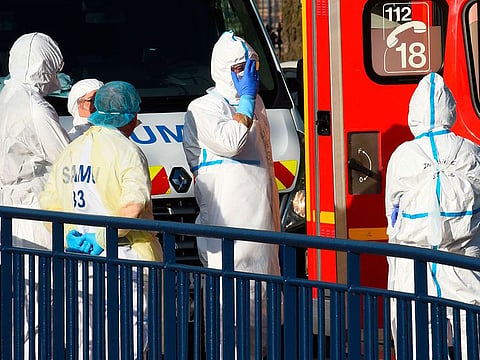COVID-19 response: World’s rich nations have to cough up funds
Emerging markets will suffer a disproportionate share of current economic downturn

The 80/20 rule – known as the “Pareto Principle” – observed that 80 per cent of income was generated by 20 per cent of the population. The formula was created by Italian economist Vilfredo Pareto in the late 19th Century. During the coronavirus pandemic, it should be applied on a global scale.
In a G20 context, the 20 leading industrialized nations represent 80 per cent of gross domestic product. They have risen to the domestic challenge of what is a global crisis due to COVID-19 by allocating a record $5 trillion dollars to keep the wheels of commerce moving in their banking systems, for small business support, and billions of dollars for unemployment benefits – you name it, domestically there has been no shortage of funds.
As UN Secretary-General António Guterres said ending the pandemic everywhere is “both a moral imperative and a matter of enlightened self-interest”, adding the G20 “must step up for the developing world”.
He was requesting $2 billion for an emergency fund to distribute medical supplies to the neediest nations of the world. In the spirit of the Pareto principle, Guterres was clearly suggesting that the poorest 20 per cent need urgent assistance from those that represent 80 per cent of global output.
The math on this is simple. Take seven of some of the most populated emerging markets – Brazil, Indonesia, India, Nigeria, Pakistan, Philippines and Turkey – and you have a total of 2.4 billion people that are in a word, vulnerable. They are not the poorest countries, but rising economies that were prepared to take their place in the global spotlight before the pandemic set in.
Cannot be starved of funds
It is in the long-term interest of the global community to ensure the coronavirus does not infect their economies much longer than is necessary. As the IMF Managing Director Kristalina Georgieva noted during the G20 leaders meeting, a record $95 billon of capital vanished from emerging markets in the first month of the crisis.
The IMF is fortified with $1 trillion of lending power to support member countries, but for 20 per cent of the global population it seems underwhelming. A sum of $44 billion of debt relief is underway for the poorest countries, and the World Bank said it has $150 billion at its disposal for emergency funding to fend off the crisis.
It seems woefully inadequate considering the severe task that has not widely afflicted the developing world at the scale of what we have witnessed in the industrialized world, whether in Asia, Europe or the US.
German President Frank-Walter Steinmeier in the past two weeks called for a new global alliance. In an opinion piece in the “Financial Times”, Steinmeier partnered with leaders representing every major continent: King Abdullah II of Jordan and Presidents Halimah Yacob of Singapore, Sahle-Work Zewde of Ethiopia and Lenin Moreno Garces of Ecuador.
“There cannot be victory over the virus in one, or some, countries alone. We all have something to contribute regardless of the size of our economies or populations. A global solution is in everybody’s self-interest,” the group of five wrote.
A coalition of the willing

What would a global coalition look like in practice? For a start, it would require multi-lateral collaboration, something that has been out of fashion when populism has taken hold in many corners of the globe. It was in the post-World War II era that the architecture was built for global solutions – the UN, IMF, World Bank and the General Agreement on Tariffs and Trade (GATT), the predecessor to the WTO.
They proved to be incredibly powerful during two recent historical challenges that I covered first hand, the fall of the Berlin Wall and the collapse of communism in the Eastern Bloc, and the global financial crisis in 2008-2010. During both of those historical shocks, no one questioned whether there was a collective will to find solutions for the greater good of society.
Leadership came out of the US and, historically, it served as a beacon of stability and hope during the worst of times.
Ian Bremmer, President and Founder of the Eurasia Group, the global advisory, summed up today’s domestic driven approach in a tweet while grading the US government in the policy response to the crisis: Monetary: A, Fiscal: A-, Healthcare: C- and International: F.
There is a groundswell of support to do better. More than 160 current and former global leaders, policymakers, scientists and chief executives want governments to approve a $8 billion emergency health fund to speed up vaccines and cures for COVID-19. It was an open letter to the G20 that wants to see urgent action to prevent a second wave of the pandemic.
Saudi Arabia, the chair of the G20 this year, has been industrious, pushing the organization to be at the forefront of policymaking and using virtual meetings to remove barriers to dialogue. It’s time the G20 – led by the US - supports that effort to apply the 80-20 principle to the biggest challenge of our generation.
- John Defterios is Emerging Markets Editor at CNN Business.







